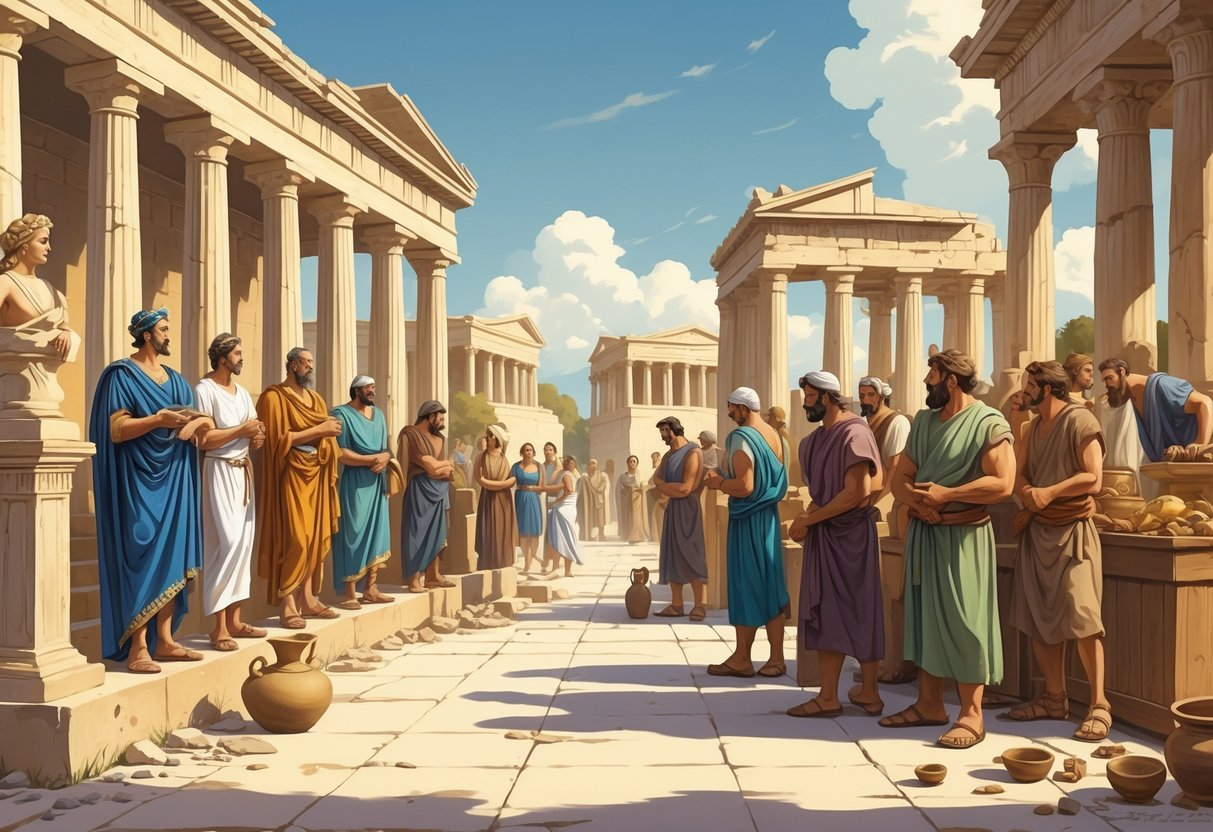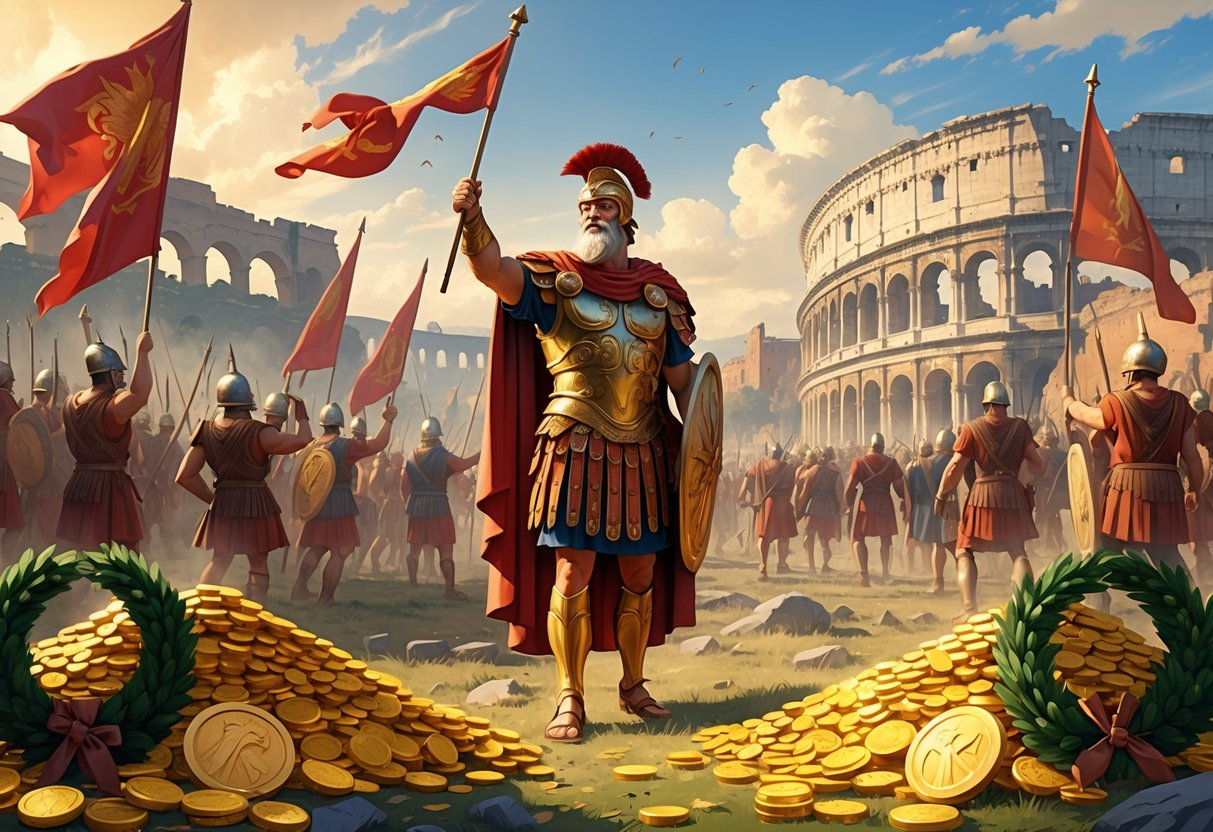Economic inequality shaped the daily lives of ancient Greeks just like it shapes societies today. Wealthy elites controlled most land and resources, while small farmers and laborers often fell into debt that threatened their freedom.
Debt in ancient Greece did more than strain individual households—it exposed deep divisions that tested the stability of the entire polis.

As Athens grew, debt became a political and social crisis. Laws allowed creditors to enslave debtors, creating unrest among the poor and fear among the elite.
Reformers like Solon stepped in to cancel debts and restore balance, setting the stage for new ideas about justice and citizenship. His actions marked a turning point that connected economic fairness to political participation.
Economic Inequality and Debt in Ancient Greece

Economic inequality in ancient Greece grew through uneven land ownership, limited access to credit, and social divisions that shaped daily life. Debt often made these inequalities worse, affecting both individual freedom and the stability of the household.
Origins of Economic Inequality
Wealth in ancient Greece was concentrated among landowners who controlled farmland and trade routes. Small farmers and laborers relied on seasonal work and often didn’t have a steady income.
This created a clear divide between the rich and poor. Athens, for example, showed big gaps in property and wages.
Studies of Athenian income inequality describe how wealth and political influence reinforced each other. Those with property got access to public office, while poorer citizens had fewer chances to move up.
Economic growth mostly helped merchants and elites, while rural workers stayed vulnerable to bad harvests and rising debt. Over time, these differences hardened into social hierarchies that shaped Greek democracy and civic life.
Role of Creditors and Debt Slavery
Creditors had a lot of power in Greek city-states. If borrowers couldn’t repay loans, creditors could take property or even enslave debtors and their families.
This practice, called debt bondage, tied personal freedom directly to economic status. In Athens, reforms by Solon in the 6th century BCE ended the enslavement of citizens for debt, freeing many who had lost their liberty.
Still, inequality stuck around as creditors continued to control access to money and land. Texts like Private Debts in Classical Greece show that private lending was common, often secured by family property.
Wealthy lenders made money from interest payments, while poor borrowers risked losing their homes. This relationship between creditor and debtor shaped both economic and social order.
Impact on Home and Family Life
Debt hit the oikos (household), the core unit of Greek society, pretty hard. Families under financial strain sometimes sold land, livestock, or even household members to cover debts.
Women and children faced particular hardship when homes fell into debt. Evidence from Economic Inequality, Poverty, and Democracy in Athens shows that poverty limited participation in civic life and increased dependence on wealthier patrons.
Some families relied on informal credit networks among neighbors or relatives. Others turned to public relief or religious offerings for support.
The household’s stability often determined whether debt led to recovery or long-term poverty, making economic inequality both a public and private concern in ancient Greece.
Solon’s Reforms and Their Impact

Solon’s economic policies tackled the debt crisis, the concentration of land, and the imbalance of power between rich and poor citizens. His measures helped reduce social tensions, brought more people into civic life, and laid the groundwork for democracy in Athens.
Seisachteia: Debt Cancellation
The Seisachteia, or “shaking off of burdens,” was Solon’s big move against debt slavery. Many small farmers had fallen into bondage after borrowing from wealthy creditors.
Solon canceled all outstanding debts and freed citizens enslaved for failing to repay loans. This reform ended the practice of using personal freedom as collateral.
It also returned confiscated land to former owners, letting them rejoin the economy as free citizens. Solon saw debt as a symptom of deeper inequality, not just a financial problem.
His actions aimed to restore balance between economic classes instead of punishing creditors. According to a study on debt and inequality in ancient Athens, this policy helped stabilize society and prevent more unrest.
Land Redistribution Measures
Solon didn’t fully redistribute land, but he did limit the accumulation of estates by wealthy elites. His policies tried to stop property from piling up in a few hands and causing more debt crises.
He divided citizens into four income-based classes—pentacosiomedimnoi, hippeis, zeugitai, and thetes—each with specific political rights and obligations. This new setup tied civic participation to economic capacity instead of birth, making things a bit fairer.
By redefining property rights and access to political office, Solon weakened aristocratic dominance. These changes encouraged broader representation and helped set the stage for later democratic institutions.
Historians looking at Solon’s reforms and social mobility say his approach balanced stability with gradual change instead of radical redistribution.
Monetary and Legal Reforms
Solon also reformed the monetary and legal systems to help keep things stable. He standardized weights and measures, which made trade easier and reduced arguments between merchants.
He revised laws to strengthen equality before the law and reduce arbitrary judgments by elites. The legal code became more accessible, so ordinary citizens could appeal decisions.
Solon’s monetary tweaks and legal clarity built trust in economic transactions and civic institutions. Scholars argue that these reforms, as described in studies of Solon’s monetary policy, linked economic fairness with political inclusion.
Together, they created the conditions that allowed democracy to grow in a more balanced and participatory society.
Long-Term Effects on Athenian Society and Democracy
Debt reforms in ancient Athens changed how citizens related to wealth, labor, and political power. These changes influenced the creation of democratic institutions and the balance between social classes.
Rise of Democracy
The debt crisis of the 6th century BC led to major reforms under Solon, who canceled debts and ended debt slavery. These moves restored freedom to many citizens and reduced the dominance of wealthy landowners.
By redefining citizenship to exclude debt bondage, Athens built a foundation for broader civic participation. Solon’s policies encouraged public involvement in government and opened up political offices to more people.
This shift helped Athens move from oligarchy to a participatory democracy. Over time, the Athenian assembly and courts became central to decision-making, making equality before the law a key principle.
Social Mobility and Class Structure
Economic reforms improved opportunities for small farmers and artisans. Freed from debt obligations, citizens could own land and take part in trade.
This broadened the middle class and made people less dependent on aristocratic patrons. However, wealth differences still existed.
While the poorest gained political rights, property qualifications still limited access to higher offices. Athens developed a more flexible social structure where status depended less on birth and more on contribution to the city.
Military service, civic duty, and public debate became ways to gain recognition. This created a sense of shared identity that helped keep democracy stable.
Enduring Economic Challenges
Even after these reforms, Athens still faced economic disparities. Trade expansion and empire wealth made some elites richer, while poorer citizens often relied on state pay for jury or assembly service.
Monetary reforms and foreign trade brought new market risks. Economic growth often came with uneven benefits, leaving rural populations vulnerable.
Debt crises popped up again in later centuries, showing that structural inequality didn’t just go away. These tensions between wealth and citizenship continued to shape Athenian democracy.
Comparative Perspectives: Ancient and Modern Debt Crises
Economic instability often brings out the tension between wealth, governance, and social responsibility. Both ancient and modern societies show how debt can deepen inequality and put political systems to the test.
Lessons for the European Union
Debt crises in the European Union (EU), especially in Greece and Cyprus, showed how shared monetary policies can put uneven pressure on member states. Studies such as The Greek and the Cypriot financial crises: a comparative political economy approach highlight how austerity measures made unemployment worse and cut public investment.
In contrast, ancient Greek city-states sometimes used debt cancellation or land redistribution to ease social unrest. Solon’s seisachtheia reforms in Athens, for example, freed people from debt slavery and brought more citizens into civic life.
The EU’s experience shows the importance of flexible fiscal policy. Unlike ancient Athens, modern states work within complex institutions like the European Central Bank, which limits national control.
But both systems show that ignoring social inequality can threaten political stability.
Key comparison points:
| Factor | Ancient Greece | European Union |
|---|---|---|
| Debt relief | Periodic cancellations | Austerity programs |
| Governance | City-state autonomy | Shared monetary union |
| Social impact | Restored equality | Widened inequality |
Modern Views on Economic Inequality
Modern economists link debt crises to rising inequality, echoing patterns seen in antiquity. Research like Equally poorer: inequality and the Greek debt crisis points out that even after Greece’s crisis, income gaps stuck around, even though the economy shrank.
In ancient Greece, wealth piling up among elites often led to unrest and calls for reform. Debt cancellation was seen as a way to keep society together, not just an economic fix.
These days, some scholars say financial systems should find a balance between being responsible with money and making things fairer for everyone. Books like Democracy and money: Lessons for today from Athens in classical times talk about how bringing more democracy into monetary policy could help make things more stable.



